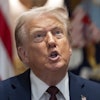CAGLIARI, Italy (Kyodo) -- Business leaders from the Group of Eight nations wrapped up their two-day meeting Friday after adopting a statement opposing trade protectionism and any move to raise tariffs on imports.
The statement was released at a time when major countries have moved, or are moving, to provide official assistance to key industrial sectors such as the financial and automotive sectors, raising suspicions that the provision of greater official aid for domestic industries may induce shrinkage in external trade.
The statement shows that business leaders from the major economies are putting up a united front to prevent the recent momentum toward freer cross-border flows of trade and investments from being scuttled.
It also called on their governments to continue providing fiscal stimulus measures to their decelerating economies in concert for the time being.
The leading industrialists, including Cho Fujio, chairman of the Japan Business Federation, Japan's most influential big-business group known as Nippon Keidanren, are moving to call on their governments to incorporate these anti-protectionist ideas into discussions they will hold this summer.
The leaders from Britain, Canada, France, Germany, Italy, Japan, Russia and the United States are scheduled to hold a G-8 summit in Italy in July.
The business leaders' statement called on the global community to step up efforts to bring the Doha Round of multilateral trade talks under the World Trade Organization to a successful conclusion by the year-end.
It also urged governments to refrain from placing priority on procuring industrial goods manufactured at home by discriminating against those from foreign manufacturers in government procurements.
It called on the governments to exert self-restraint in introducing export subsidies to aid their domestic industries.
The business leaders apparently shared concerns that large stimulus steps would expand government budget deficits and urged their governments to draw up beforehand plans to put their fiscal houses in order after their economies come back on recovery track.


















